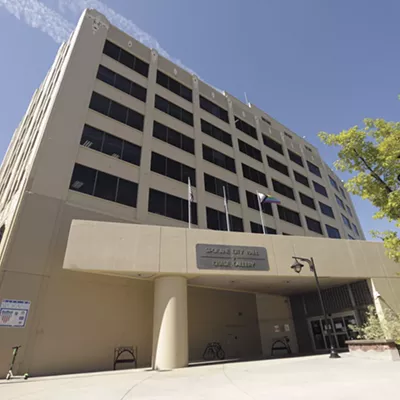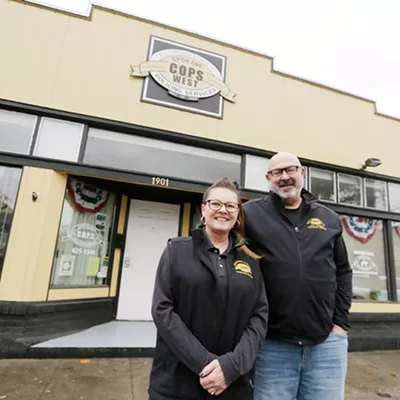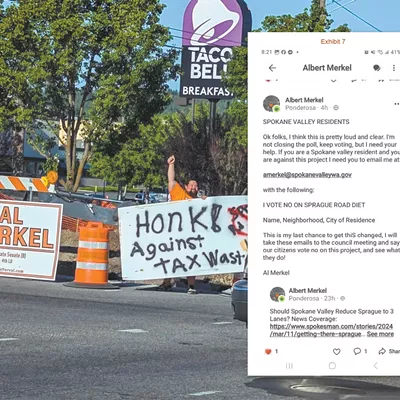
Spokane City Council President Breean Beggs plays the long game.
Before he was appointed to the council in 2016, he was a police reformer. As the attorney for the family of Otto Zehm, who was beaten by police and died days later, Beggs pushed for the creation of an independent police ombudsman with investigative powers. That took seven years.
Once on the council dais, it took nearly six years for Beggs to get his landlord-tenant reform efforts to pass.
Slow and steady, the thinking goes, wins the race.
Now, his finish line might be moving up. He's already announced he's not running for re-election, but Beggs might not even complete the last year of his first term as the council's leader.
"I am being considered for a judicial appointment locally. ... The governor decides," Beggs says about a court opening in July. "So that could be an earlier departure."
That itself would create another political shake-up: Council President Pro Tem Lori Kinnear would move to the council president role for her last six months in office, creating a temporary six-month vacancy for her seat.
But for Beggs, it means that he has a limited time to set into motion his bucket list of ordinances still left on the table, all while assessing whether his softer and more collaborative approach has been successful at accomplishing his agenda.
"One of my disappointments at City Council: I thought I would have way more impact on criminal justice reform," Beggs says.
Some of that, of course, is just the nature of the role. Cities handle policing and misdemeanors, but felonies and jails are the domain of the county.
And yet, when the murder of George Floyd sparked upheaval across the nation in 2020, few leaders were as well positioned to bring about major reforms.
"Breean has been the best ally I've ever seen for criminal justice reform," says Spokane NAACP President Kurtis Robinson.
Beggs, a constitutional law attorney, was best known for having sued the city following Zehm's beating and death. He was "chief catalyst" at the Center for Justice, a legal advocacy group for low-income people. In 2020, he had a list of 24 police reform ideas. But instead of trying to push them through quickly, he tried to forge consensus.
Because while there's Beggs the litigator — the kind who pushes for change — there's also Beggs the mediator, who seeks to build something closer to consensus. That, he believes, is the key to ensuring lasting change.
For instance, he and Mayor Nadine Woodward's administration launched a closed door roundtable about policing with members of the community, the police and the council. But that didn't start until nearly a year after Floyd's death, and participants quickly ran into what Beggs calls a "Lemony Snickety" series of unfortunate events.
"I was diagnosed with cancer in the middle of it," he says. One of the facilitators also got cancer and eventually died. The head of the police union was shot.
Little progress was being made and, in January 2023, the final meeting of the group was canceled. It was roundly considered a failure.
"People got frustrated. They kind of assumed that there was some person who was really in charge and could have fixed it," Beggs says. "I don't think I did a good job of really communicating with the participants about what was going on."
Either way, Beggs says he doesn't blame people who are upset that he tried to take the slow path and it didn't work out.
"I don't begrudge them that," Beggs says. "Being willing to sacrifice short-term gain for a longer term gain... It's a calculated risk. It's a speculative bet."
Some people survive cancer and are imbued with a kind of seize-the-day, every-moment-counts drive to accomplish all their ambitions. But for Beggs, it was the opposite. He says he became less task oriented.
"I think I became a little more philosophical about things," Beggs says. "Less tied to outcomes and more the process and experience of things."
So while ideologically Beggs is as progressive as his predecessor, Ben Stuckart, Stuckart was a lot more apt to show it with fiery speeches and aggressive gambits.
"Breean is more measured. A less reactive person," says Kinnear. "He's more thoughtful. He's more collaborative."
But while Kinnear doesn't blame Beggs for how long the landlord-tenant ordinance took — that fell prey to COVID — she knows his tactic of seeking consensus means things sometimes get done more slowly.
"Overall, I think it's a wonderful trait," says Council member Karen Stratton, before adding, "Sometimes that's maddening. He knows that I get impatient."
Council member Michael Cathcart, one of the two conservatives on the council, is a little less impressed with Beggs' touted consensus building. He says that Beggs mostly tries to build consensus with his fellow progressives. Still, there are plenty of times when they've worked together, like on housing reform.
Beggs points to a 7-0 vote last year — including even traditionally development-skeptical council members — to remake Spokane's housing code allowing anything up to fourplexes everywhere.
Beggs prides himself on his empathetic approach to building coalitions of allies. But he knows this approach has its drawbacks.
"I think some people confuse that with, 'I'm their best friend,'" Beggs says. Or it can wrongly make people think he's a pushover.
"He's been just a gentle human being, and I love that about him," Robinson says. "The fact is that a lot of people just read that the wrong way."
That's not to say he doesn't occasionally get pissed off.
"The times that I've been the most angry: When I felt completely lied to by high-level people in the administration," Beggs says.
Still, both the successes and the failures of the Woodward administration are inevitably tangled up with the council. Responding to questions for this article, Woodward stressed the ways they'd been able to find common ground on issues ranging from housing to criminal justice.
"While we fundamentally disagree at times, I meet with the Council President weekly and have appreciated the chance to engage in professional debate in search of ways to put the community first," Woodward wrote in an emailed statement from her campaign.
Most recently, she cited the example of the unanimously supported ordinance restricting public drug use. Beggs had worked hard on this measure, but it was clear from his words before the vote that it was a painful victory. His father used to run a heroin addiction treatment program, and Beggs didn't think that cracking down was the secret to success.
"This is about the third version of the war on drugs in my life, and there was always that same hope — that if we just pass the law, if we just say no, if we just let people know how much we care about them and want to avoid the damage — that somehow that will stop it," Beggs says. "And I don't think it will."
But Beggs saw it as a temporary compromise meant to ward off even worse outcomes.
Last week, Beggs says, he got a message from a progressive "really pissed" about the vote.
"Like, 'I'm really disappointed in you,'" Beggs says. "'You're going to hear about it publicly.'"
"Just because I might have an understanding of how I think best to deal with drug abuse doesn't mean my community understands that yet. I have to stay within that," Beggs says. "And that is my role as an elected City Council member."
But Beggs knows that the political realities are limiting — tough words for fellow progressives.
"We could pass a bunch of laws on police reform. But the mayor is not going to follow them," Beggs says.
But he's never been the sort to give up. He lost his seat on the Spokane Regional Law and Justice Council, so he's creating a "Municipal Law and Justice Council" instead.
He has criminal justice reforms that he wants to push in his remaining time on the council, including a plan to allow members of the public to sue police departments for policing practices. Officers who follow the procedures would still be protected, but the departments themselves wouldn't.
"Right now, police departments don't have a lot of incentive to change their training and policies that are causing injuries to community members," Beggs says.
There's a risk of going too slow. But Washington state showed what can happen if you pass reforms too quickly, without the buy-in of key groups. The backlash to the Legislature's 2021 police reforms — restricting when cops could chase cars or use force — sent politicians scrambling to reverse and clarify controversial and unclear elements of the new laws.
"This is just my deep core belief," Beggs says. "If you want to do police reform, criminal justice reform, sustainability, equity and inclusion — all those things, you have to create deep change in people's minds and hearts and the culture."
As utopian as that sounds, he says it's happened before: He points to his work with the Center for Justice to try to simply get people to care more about the Spokane River.
"Now almost everyone's together on the river," he says. That fight has been won.
Today, he has more power and resources, he says. So his tactics change. But his goals haven't.
"Frankly, we need people protesting and marching in the streets. We need lawyers filing lawsuits. And we need people like myself," Beggs says. "I still see myself as a change agent... That's what I do. I'm good at that." ♦
This article has been changed to show that Beggs was appointed to the council in 2016. He was elected council president in 2019.
























